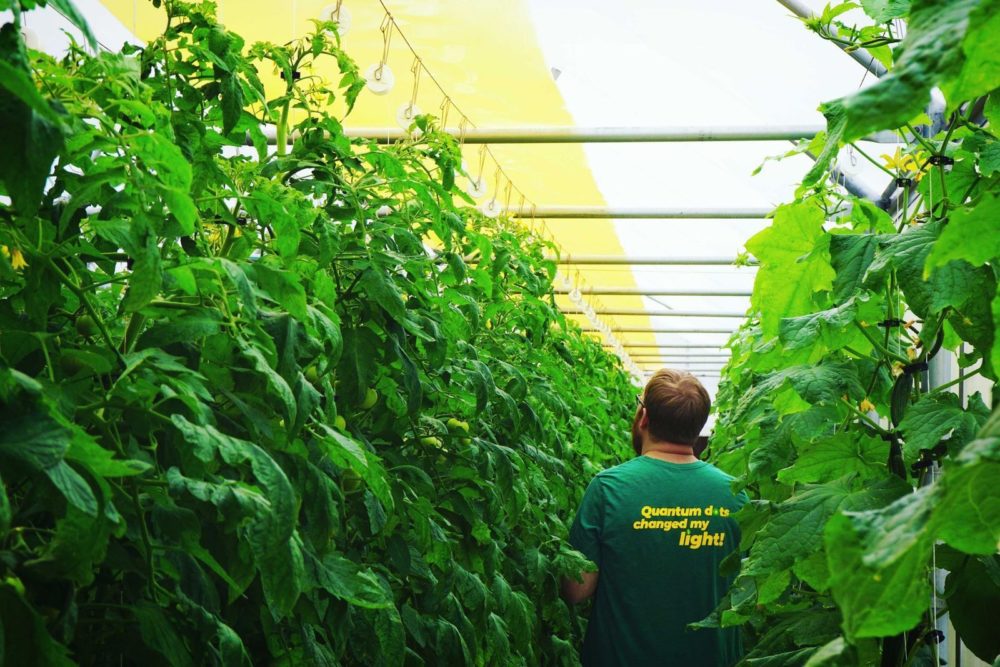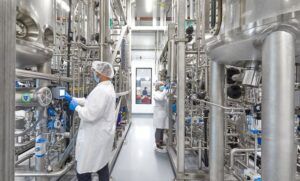Advanced materials startup UbiQD (pronounced ‘ubiquity’ and short for ubiquitous quantum dots) has closed a $7 million Series A funding co-led by Scout Ventures and Keiretsu Forum, with additional participation from Sun Mountain Capital, Epic Ventures, Plug and Play Ventures, Arcview Collective Fund, and others.
New Mexico-based UbiQD offers quantum-dot nanomaterials that can manipulate color and concentrate light. Its proprietary formulation of quantum dots is safer, more cost-effective, and more durable than any existing alternative, according to the startup.
Among the many market opportunities that UbiQD sees for its product, the indoor farming space is its first frontier. Electricity is one of the largest costs for a vertical farm or greenhouse. One analysis from 2018 concluded that a 30,000 square foot greenhouse in New York City should allocate as much as $216,000 each year for electricity costs and another $120,000 for heating, ventilation, and air conditioning.
UbiQD embeds quantum dots into glass and pliable films to create a lighting source with no need for an external electricity supply. Through pilots with customers, it has determined that its technology can achieve 10% to 20% higher yields than equivalent electrically powered systems with faster cycle times, reduced waste, and improved crop quality. This equates to savings, boosted revenue, and more margin, according to UbiQD.
“It’s about $3 per square foot if you want to buy our film right now,” Hunter McDaniel, UbiQD founder and CEO, told AFN.
“If you want to install high efficiency LED lighting say from Fluence or Philips, it’s $60 per square foot to buy it, $10 per square foot per year to run it.”
Much of the startup’s early work has been in the cannabis space. A cannabis operation in Hood River, Oregon recorded a 7.7% increase in yield and an estimated $1.28 million in increased profit pro rata thanks to UbiQD technology.
Market leader makes strategic investment
UbiQD commercial partner Nanosys also joined the Series A round as a strategic investor.
“They’re one of the leaders of quantum dot technology in this industry,” McDaniel said.
“They’ve pioneered the first commercial markets and have the strongest position in terms of their IP, revenue, and traction. They’ve proven quantum dots can be a real thing commercially. For us, it’s a little scary to dance with them because of their muscle and brand. But having this equity component really aligns our interest and means that our success is their success so it gives us a bit more comfort.”
The funding will be used to support the rollout of UbiQD’s first commercial product, UbiGro – a film that can be attached to greenhouse ceilings to help plants use sunlight more effectively. Some of the first customers for the product — which UbiQD describes as “a layer of light” — include major international greenhouse operations that span millions of square feet, according to the startup.
The funding will also help support R&D for more advanced UbiGro products, including the formulation of ‘light recipes’ that can be tailored to maximize productivity for different crops and geographic regions.
Taking the sting out of the electric bill
Many indoor farming startups are looking at how to cut electricity costs in order to make the model more viable.
Germany’s Infarm sources 90% of the energy used throughout its network of distributed indoor farms from renewable energy. It has a goal of reaching zero-emissions food production by 2021.
Startups providing ancillary technologies to support indoor farming are also aiming to cut the power bill. In addition to UbiQD, UK-based Intelligent Growth Solutions makes smart grid systems to reduce electricity usage. [Disclosure: Intelligent Growth Systems has received investment from AgFunder, which is AFN‘s parent company.]
There are several startups working on quantum dot technology, but McDaniel believes UbiQD is the first one with a commercial product in the market.
As for challenges other than electricity, McDaniel lists access to financial resources as the biggest one.
“It can be particularly hard for a deep tech or materials and chemicals company. Things have a perception of being slower,” he said.
“So this funding is a huge milestone for us, to have gotten there with these investors – getting to the point where we’ve got venture capital actually pulling the trigger.”





